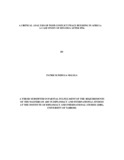| dc.description.abstract | Conflict is endemic in the African Continent. Many regions in Africa have experienced
conflict or are still in conflict. It is therefore important for us in Africa to manage postconflict
situations. This is where Post-Conflict Peace Building comes in. The challenge at
hand is not to eradicate conflict, but how to manage it.
Many conflicts in Africa are as a result of the resources that we have. They may be
environmental, such as Land and Minerals or Political Power to control such resources. PostConflict
Peace Building cannot just be militarized. It needs to focus on the root cause of the
conflict and how to change that. In the case of Africa, it needs to focus on equitable
distribution of resources. This can be done through Institutional reforms, Political reforms
and any other initiatives that will ensure that positive peace is achieved in post conflict
situations.
Many Governmental and Non-governmental organisations are involved in post-conflict peace
building. This has really been instrumental in mainstreaming peace- building. The field is
really growing fast. In Africa, where conflict has happened a lot and could happen anytime,
post-conflict peace building is very important and needs to be embraced by all of us. | en_US |

